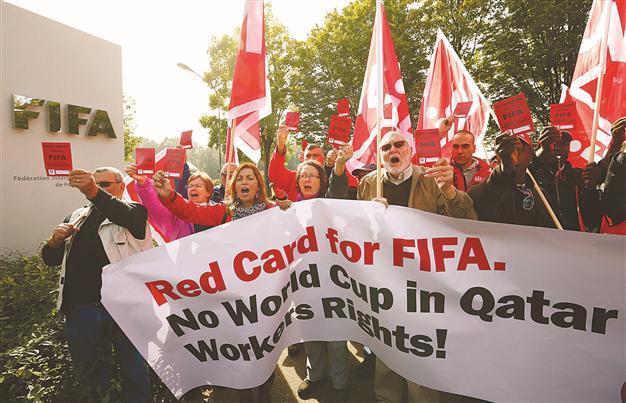Qatar’s 2022 venture: Perfecting the skill of scoring own goals
JAMES M. DORSEY

Members of the Swiss UNIA workers union display red cards and shout slogans during a protest in front of the headquarters of soccer’s international governing body FIFA in Zurich. Al-Jazeera’s lack of reporting also comes under fire. REUTERS Photo
State-owned Qatari television network Al-Jazeera prides itself on hard-hitting, let-the-chips-fall-where-they-fall reporting. Yet, it has systematically avoided in recent days the one story that potentially could affect the very future, shape and security of the wealthy Gulf state: controversy over the timing of the 2022 World Cup and mounting criticism of the living and working conditions of up to a million unskilled and semi-skilled workers expected to build infrastructure for the tournament.That controversy is coming to a head with world soccer body FIFA under increasing pressure to revisit its awarding of the tournament to Qatar. FIFA’s executive committee postponed a decision on changing the timing of the 2022 competition until after next year’s World Cup in Brazil and instructed its chairman, Sepp Blatter to meet with Qatari emir Sheikh Tamim bin Hamad al-Thani to discuss the often appalling conditions for foreign workers expected to be involved in the construction of tens of billions of dollars of infrastructure related to the tournament. This is a sensitive issue for Qatar, a country in which local nationals constitute at best 15 percent of the total population and 6 percent of the workforce.
Fate of workers
The fate of workers moved to the top of the agenda after British newspaper The Guardian reported a mounting number of work-related deaths in Qatar, confiscation of passports and lack of access to basic amenities including drinking water in an exposé of the onerous kafala or sponsorship system that makes workers beholden to their employees. Nepalese trade union officials attributed many of the 70 deaths among their nationals to falls because workers had not been given proper safety equipment.
The International Trade Union Confederation (ITUC) secretary-general added that “scores are dying from heat exhaustion and dehydration after 12-hour shifts in blazing heat, often during the night in the squalid and cramped labor camps with no ventilation and appalling hygiene.”
What Qatar had expected to be a celebrated achievement in its projection of soft power when it won the World Cup hosting rights almost three years ago has turned into a public relations fiasco that spotlights existential questions about Qatar’s political and social system, its demographic viability and the sustainability of its national identity. Al-Jazeera’s avoidance of the issue spotlights the fact that the fiasco is one of Qatar’s own making.
Al-Jazeera’s lack of reporting in the run-up to the FIFA meeting goes far beyond restrictions on media in an autocratic state. It highlights the fact that Qataris remain hesitant to publicly engage their critics in a bid to demonstrate the fact that they take at least some of the criticism seriously and to explain issues that are in many ways unique to the region’s smaller family-run states. Qataris are learning the hard way that their failure to engage amounted to surrender of the battlefield to their opponents and more fundamentally that winning the right to host the World Cup enhanced their prestige but also exposed their warts and gave leverage to activists campaigning for a plethora of rights, including those of workers.
The Al-Jazeera avoidance of a sensitive issue for Qataris further focuses attention on the problems smaller Gulf states have as they try to get a grip on a world in which technology and social media impose greater openness, public lack of confidence in institutions and leaders has toppled governments and the need to project soft power as part of a nation’s security and defense policy forces them to confront painful and existential issues.
First and foremost among these are foreign workers’ rights in a part of the world that traditionally strives to ensure that non-nationals were welcome to fulfill their contracts but would be prevented from gaining a stake in society. In responding to criticism by human rights and labor activists, Qatar has gone beyond issuing lofty statements of principle in a bid to address material concerns and fend off political demands, including abolishment of the kafala system and the granting of the right to form independent trade unions and bargain collectively.
Autocratic reflex
To be sure, deflecting political issues is partly autocratic reflex. It is, however, also a function of problems for which there are no easy solutions. Ray Jureidini, a sociologist and migration expert at Beirut’s Lebanese American University, who advised the Qatar Foundation on establishing standards for the full cycle of a foreign worker’s employment in Qatar, including recruitment, deployment, working and living conditions and return to country of origin, notes that abolishing the kafala system would amount to a significant overhaul of the Qatari economy.
“The kafala system exists as part of an effort by Qataris to retain control of their country. Abolishing the system means opening up a labor market in a country where there is no labor market. The requirement for an exit visa is partly the result of Qatar not having extradition treaties with a lot of countries and wanting to prevent those who break the law from simply skipping the country,” Mr. Jureidini says.
The Australian-Lebanese scholar concedes that Qatar would do itself a favor by publicly acknowledging the issues it faces rather than by remaining silent projecting the notion of a nation that cruelly implements a system denounced by activists as modern slavery. The same is true of the reluctance by various Qatari institutions to freely discuss the details of steps they have or are taking to improve workers’ conditions including ensuring that workers do not pay for their recruitment – a key issue with vast numbers of laborers indebted for years to corrupt and unethical middlemen who arrange for their employment.
















